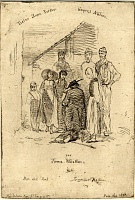Etchings Institutions search term: british museum
An Artist Sketching | ||
| Number: | 23 | |
| Date: | 1858 | |
| Medium: | etching | |
| Size: | 155 x 107 mm | |
| Signed: | no | |
| Inscribed: | 'Treize Eaux Fortes d'apres Nature - ' at top; 'par / James. Whistler - / à / Mon viel Ami Seymour Haden.' lower centre; 'Imp. Delatre Rue St. Jacques. 171.' lower left; 'Paris Nov 1858.' lower right | |
| Set/Publication: | no | |
| No. of States: | 1 | |
| Known impressions: | 1 | |
| Catalogues: | K.25½ | |
| Impressions taken from this plate (1) | ||
KEYWORD
artist, children, man, portrait, sketching.
TITLE
Whistler's original title is not known, although a title for the set of etchings was etched on the copper plate.
'Treize Eaux Fortes d'après Nature' (1858, Whistler). 4
'Whistler Sketching' (1910, Edward Guthrie Kennedy (1849-1932)). 5
'An Artist Sketching' (2010, Whistler Etching Project).
Whistler's inscribed title is intended for the 'French Set' rather than this individual etching. Kennedy's title is inaccurate since the etching was based on a drawing of Ernest Delannoy (d. 1860/1870). However, since it is not absolutely certain that Ernest was the sitter, 'An Artist Sketching' is the preferred title.
'Treize Eaux Fortes d'après Nature' (1858, Whistler). 4
'Whistler Sketching' (1910, Edward Guthrie Kennedy (1849-1932)). 5
'An Artist Sketching' (2010, Whistler Etching Project).
Whistler's inscribed title is intended for the 'French Set' rather than this individual etching. Kennedy's title is inaccurate since the etching was based on a drawing of Ernest Delannoy (d. 1860/1870). However, since it is not absolutely certain that Ernest was the sitter, 'An Artist Sketching' is the preferred title.
4: Etched on the plate.
5: Kennedy 1910 (cat. no. 25 1/2).
The 'French Set' contained thirteen etchings in all - that is, twelve etchings plus the frontispiece; this explains why this preliminary design for the frontispiece specifies 'Treize Eaux Fortes', which was changed to 'douze' in the final design (The Title Page for 'Douze Eaux Fortes d'après Nature'
[22]).
DESCRIPTION
A group of children, and behind them a woman and two men, stand looking at a seated artist who is sketching. The artist, seen from the back, wears a low-crowned, broad-brimmed hat, and his knapsack lies on the ground behind him.
SITTER
An artist sketching
[m0270], pencil, Freer Gallery of Art.
The etching is based on the drawing reproduced above, An artist sketching
[m0270]. It was probably Ernest Delannoy (d. 1860/1870) who posed for the drawing. Charles L. Drouet (1836-1908) told the Pennells years later that Whistler and Delannoy wore similar linen suits for their trip 'and so Ernest was able to pose for the portrait, all but the face, in the title to The French Set of etchings'. 6
6: Pennell 1921C , pp. 49, 171.
DISCUSSION
Whistler's drawings may have been intended to be used as the basis for etchings when he returned to Paris. Drawings have survived for five of the etchings in the 'French Set': Street at Saverne
[14], La Marchande de Moutarde
[20], The Kitchen
[16] and The Title Page for 'Douze Eaux Fortes d'après Nature'
[22]. The drawings are: The Kitchen
[m0235], A street at Saverne
[m0237], An artist sketching
[m0270], r.: Succès d'Erneste à Cologne; v.: Tracing of recto
[m0271], La Marchande de Poterie à Cologne
[m0272] and La Marchande de Moutarde
[m0273].
However, one can not assume that where no drawings survived, there were none. Some drawings may have been an aide-memoire for etchings already started, some may have formed the complete and sole basis for etchings done on the trip or when Whistler returned home. Some etchings, like The Unsafe Tenement
[18], were drawn direct from nature. Finally, some were based on more than one drawing.
This draft of the title page was just such a composite: it showed the artist from the back, and to his right, the three figures watching him (reversed from the drawing). However, in the etching, Whistler added four more figures. Some details of the drawing were lost in the etching, and for once, Whistler lost the character of the figures, without adding any sense of life or drama. He also made several mistakes in the writing.

